Donna Mae Lebsock Hansen
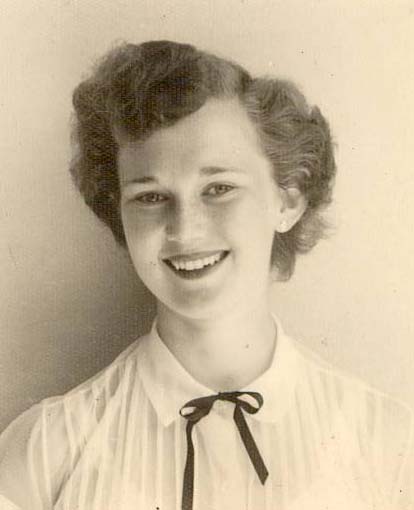

|
|
Donna Mae Lebsock was born on January 22, 1935 to Harry Lebsock and Hazel P
Lebsock (nee Spear), in Jefferson County, Colorado. Her family came to America
in the 19th Century from Germany. Her father, Harry Lebsock, was born in
Nebraska, and she was born in Colorado. Harry Lebsock and his brother owned a
grocery store in Brush, Colorado. He was encouraged to apply for a job at
Aramco. After being hired in 1948, he moved to Saudi Arabia. Two years later
the rest of the family followed to Dhahran, Saudi Arabia. My grandmother
relates that there were no high schools in Arabia, so she was sent to a
boarding school in Beirut, Lebanon. Her mother and her only surviving sibling
stayed in Arabia. After graduating, she moved back to the States and married
John David Hansen, whom she met overseas. They had three children. I talked with her in March 2007 over the telephone. Our interview focused
on her time in Lebanon.
So your dad was in
Aramco?
My dad worked for Aramco--the Arab American Oil Company. And that was a
combination of Standard Oil-and some of this I'm trying to remember.
California, Texas, and I can't remember the other state. But it was…Standard
Oil.
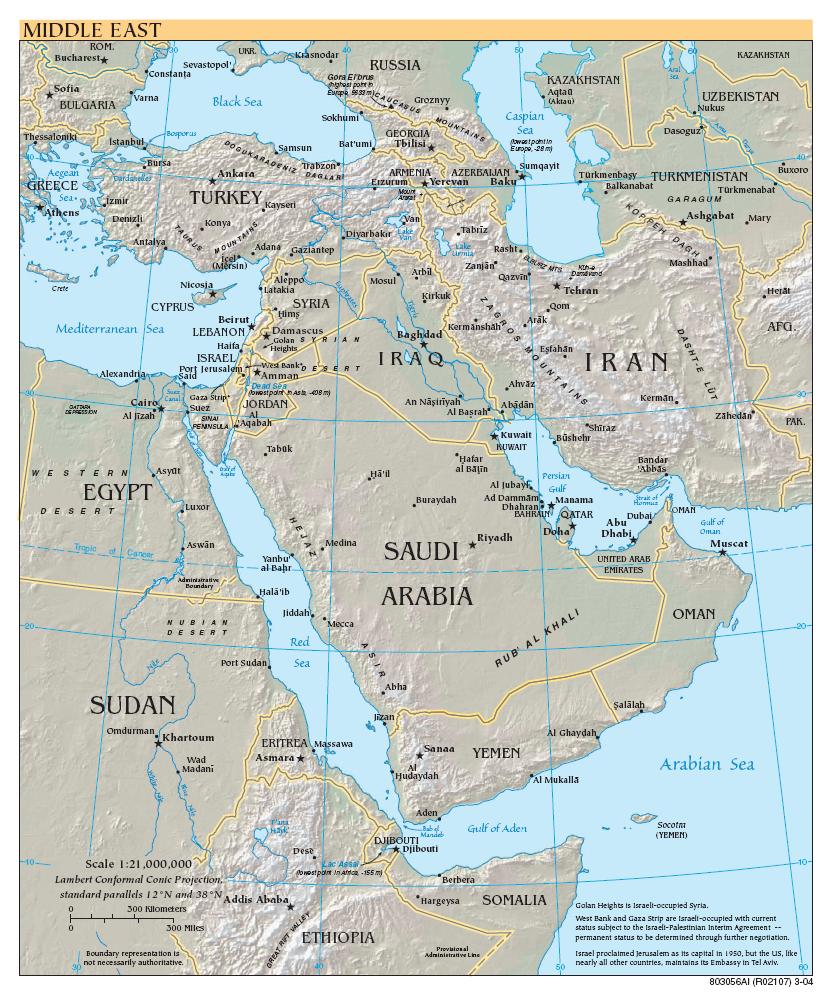
Pennsylvania?1
Pennsylvania perhaps. Yes, because there was an eastern state in standard
oil. The standard oil formed a company with the Saudi Government and it was
known as the Arab-American Oil Company, and they sent out some of their first
oil geologists in 1933] out to the Arabian Peninsula for oil exploration. And
there is a book of the early exploration and it is called,
Discovery and it is by Wallace Stegner. He also wrote a Pulitzer
Prize novel, Angle of Repose. But Discovery is a really good history of
1933 going forward.
Your father was Harry Lebsock?
And my father was Harry Lebsock.
Okay. Was Saudi Arabia independent then?
It was a monarchy just as it is now. And uh it was. Riyadh was a large
community city where royalty lived. And Mecca was a religious capital for the
Muslim community and those who are Muslim try to make at least one pilgrimage
there during their lifetime. And they make their prayers-the Islamic prayers
which they do several times daily, and I don't know how many times they do
it-but they pray facing Mecca, no matter where they are in the world, they face
Mecca.
Okay. Did your father go over before you and your family came?
Right; he went over in 1948. And that was common for employees with
families. They make their way over. And they had what they call shacks or
housing, with rooms that could accommodate, I don't know, um... They called
them barasities. I don't know what that means. But I know it was a house. They
each had a bedroom, and there was a common living room and a common cooking
area. And there would be four men sharing one house. After they'd been there
for eighteen months to two years and they accumulated enough housing points. It
depended on your status in the hierarchy of the employees. If you were a high
level employee you got more housing points. So it took most of the people, like
my dad eighteen months or two years to get enough housing points to have a
house for the family. The company would then pay for the travel for the family
to accompany the employee to Arabia.
And a little interesting thing is before we went over the company would pay for the family's husband, wife, and all their children up until they were high school age. So in 1950, when we went over, they were only paying for kids up to 14 years old; and I was 15. And my folks had to pay my way, which was quite interesting. (And then later I think they changed it again.)
But there was no high school there. So maybe that was part of their reasoning; why would they bring them to Arabia when there was no high school there for them? So, those of us who were the offspring of the employees of Aramco [and were high school age] were in other places-such as [in Lebanon and] in Italy. And, some of them, their families put them in boarding schools in the United States.
And you only had one sibling?
Yes. I had my younger brother Kenneth. And he went to school-he was almost
four years younger than I. He went to school in grade school and junior high in
Arabia.
Oh.
And then by the time he got to high school, he and Mother were living at
Beirut (which is the high school I had gone to in Beirut), after I had left
there.
Okay.
It was a boarding school that I went to in Beirut and I really thought it
would be horrid and I really loved it. It was great.
Oh, you did?
I loved it! Yeah.
What did you do?
Well, we had it-it was the first year-they would have had a dormitory and
they had been in an older building before that. They got their donations, and
they got enough money to build another building. And they were side by side,
quite new. They were on the main floor with a dining room, and kind of a living
room, and the infirmary where you went to stay if you were sick. And the
house mothers often were on that floor. Then on the next floor were the boys. I
think the high school boys on that floor. And the next floor up was what we
considered the little kids and that was the grade school kids. We were on the
upper floor and that was the girls' floor. We went up
separate stairways to the girls' and boys'
floors.
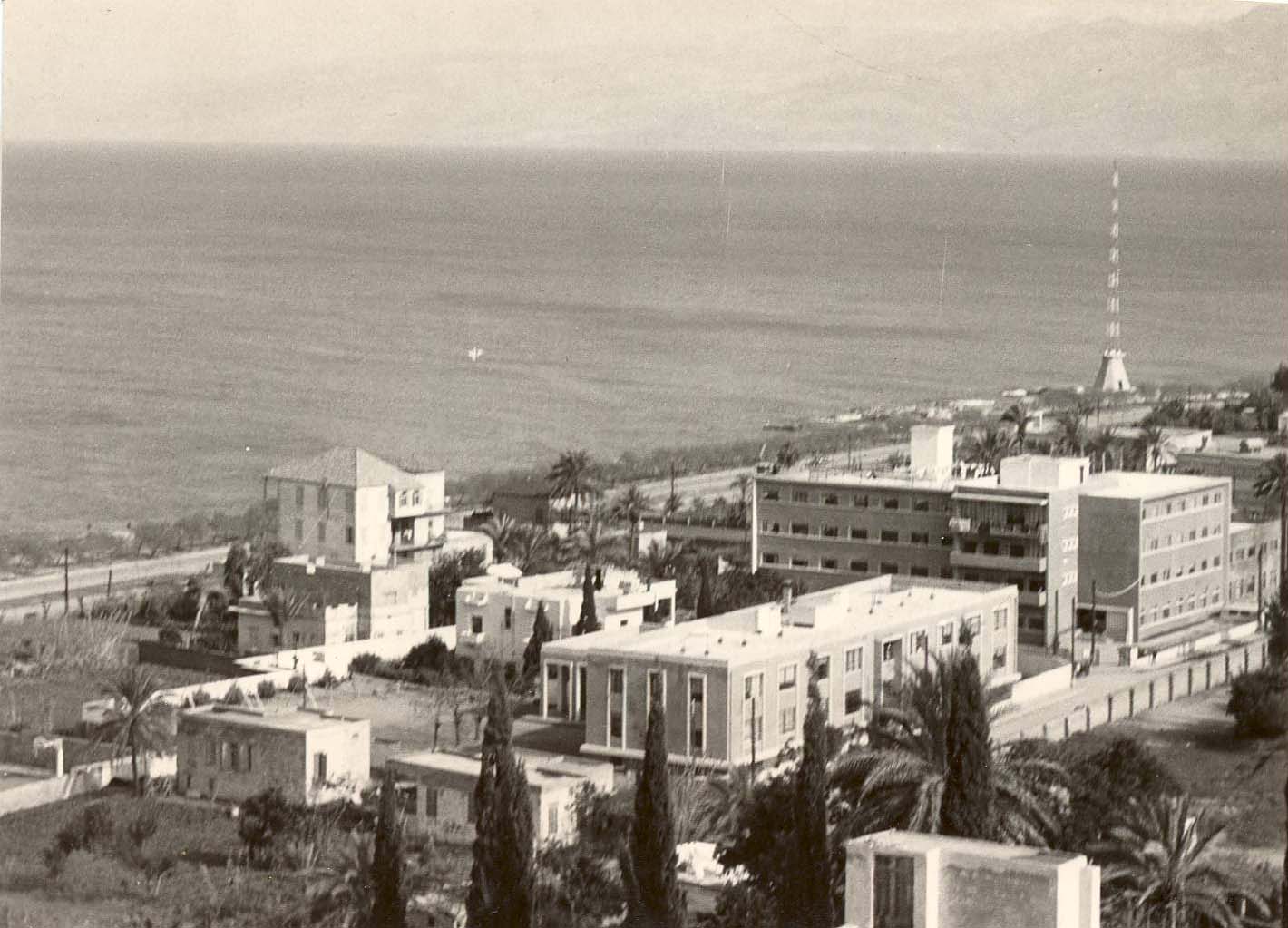 |
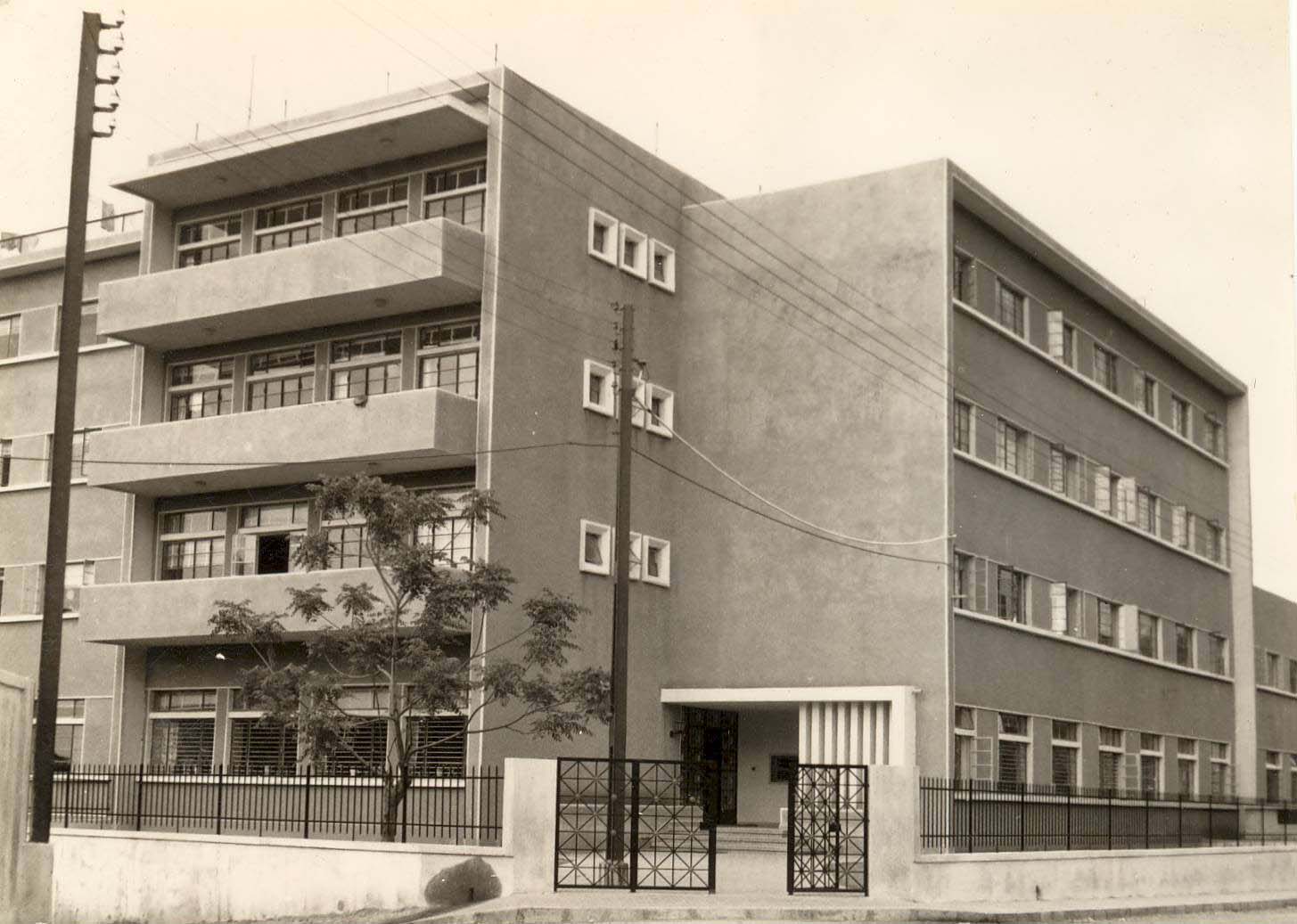 |
Okay. This was an American school?
Uh-huh-American community.
Was it near the American consul?
Uh, umm. The American consul… [thinking] … It wasn't
around near there. It was more near the downtown. I don't remember ever having
to go there, but I went by it on the tram. But it was closer to downtown,
because a lot of the consulates of all the countries were kind of in a similar
area.
A little interesting sidelight was a boy in our school made a little home-made bomb. I don't know what he made it of, but it was a bomb. And he went down and lobbed it over the fence into the Russian embassy, and of course there was tension between the Russians and the Americans at that time. So it created this little international incident and dear old Harry was expelled, and had to go to school in a different country.
What was it that he threw?
He made a bomb and then tossed into the Russian embassy.
Oh… So was the Cold War-what was happening then?
There was conflict between the United States and Russia, in that they were
not posturing, but there was no war as such. They were still cooperating after
the war at that point. That's when the
State of Israel was formed, and I think Russia [had a hand in that.]
The countries in Europe, the countries in the Middle East-everything-had been
divided-who would be running the show in those countries they had conquered.
Russia and the United States had done in some of the countries such as Germany,
which was split. So I guess that was the beginning of the Cold War. Because a
student […] when I was there, and that was the 50s and that was between the
United States and Russia. So it probably was the beginning of the Cold War, it
comes to mind.
Wow. (Here I was a little amused because it sounded like her classmate started
the Cold War)
Right. During that period of time from 1950-1953, Dad and Mother and
Kenneth and I went across Europe. We thought we'd have time to take a longer
family trip. We went through Austria and Germany on that trip and there were
some places we could go up to the border but we weren't supposed to take
pictures across, because that was the Russian territory in Germany.
Oh.
So, Dad had wanted to go to Leipzig, Germany where
his family had come from, but we couldn't go there because it was in the
Russian section of Germany. So we weren't allowed to go in.
So your dad's family was from Lydstick [sic]?
Leipzig, Germany, right. But they had gone from Leipzig, Germany into
western Russia. And they lived there because of the Depression, and the
oppression of certain Germans. And so they lived there for ten years, and then
they immigrated to the United States, after Russia. But the family originated
in Leipzig, Germany.
My history teacher was just telling me about something. I think his
great-grandfather was in Germany about the 1880s.
Yes.
And I think he was a furniture maker and he had just all boys. And there was a
draft. The history teacher thinks he might have left Germany (maybe) because he
didn't want all his boys to be gone.
Right. So did he go to Russia or did he come to the United States?
He came to the United States; I think New York.
Okay. Because Dad's family went to Russia and it may have been because of
the Depression and also because of the draft. So they were there for ten years,
and then they came by boat.
Okay.
So there was a lot of [migration] out of Germany at that time.
Do you think we could find their names in the Ellis Island register?
Perhaps you could. And I know that there is a - my aunt wrote a history of
the Lebsock family. And I realize I think I [had] a copy of that at one time.
And it kind of talks about the immigration the family did. But [she] does have
a copy of it. You remind me again of it in about a couple of weeks, and I'll
see if I can find a copy made.
Okay, I'd like that.
Yeah, yeah. It's kind of interesting to see. You know, she wrote it from
sitting and talking with some of the children in the family, and there is
genealogy in it. So, if you find 'Lebsock' on some of the genealogy sites, it
talks about Barbara Roth and John Lebsock, and those were my father's parents.
So another story about that.
Oh, thank you.
Yeah, yeah.
So was Lebanon
still under France's rule?
It was not then, no. It was theoretically, it was a free country at that
time, self-governing. And-but it had been conquered and ruled by many, many
different nations over the period of history. And there was such an ethnic
influence by some of the Europeans who had come to live there, that there were
lots of little Arab kids that had red hair, like the red hair Europeans had.
Wow.
Most of the children there-when I was there-spoke three languages. French or
Arabic would have been their native language, depending on their heritage and
their parents. And then English was broadly used because it was an
international trade center. So most little kids, five years and younger, spoke
all three languages.
Yeah. It was a beautiful, beautiful country, and before the civil war of
the '70s with its such terrible destruction. ... And the bombing last summer
flattened it again. It's very sad. The tourist [industry] had started to
recover .
Wow.
Yeah. And they spoke them well.
I read that it was a banking center.
It was. It was beautifully situated geographically in that it had a good
port. And so it was a banking center for the Arab countries and the European
countries.
It used to be a […] all those sailors from the Phoenicians.
What?
Like, the Phoenicians?
Yes.
It's interesting.
And Baalbek was one of [those cities built]; a beautiful city in Lebanon in
ruins.
What city was this?
Baalbek.
Did you go there?
Yes.
So when did your family leave?
Well, I graduated high school. So at that time I came back. And Mother and
Kenneth were living in Beirut at that time. And then my Dad switched companies,
so we had to accumulate housing points again. So after he got his housing
points, they went back---or she went back to Arabia, and I think Kenneth lived
in Beirut for a time. But then Mother lived with Dad in Arabia up until, let's
see, that would have been about '59. Then she came back to the States, and then
Dad came back a couple years later. So by the early '60s, everybody was back.
Were you glad to be back?
Uh, well in-. I was glad. [silence]
I really liked it there. I liked it a lot. But I was going to college, and
of course I thought, you know-I thought I was in love. And that was an
important experience in my life. So your grandpa and I both went to the
University of Idaho, then married the following year.
It was an exciting time in my life, but it was still very different from what
I'd done in Beirut. But I think that it was probably a period in my life where
I learned of and met the most broadening people and had the most eye-opening
experiences-those things which made me more tolerant of other cultures. It was
a time that I got to handle. Because, you know, when you live in that sort of
environment, you really don't have much mind or thought for being prejudiced,
if you want to really get the most out of your experiences.
So it was a good time for me to be there. Usually people are quite
open-minded unless they are taught to be [prejudiced]. It was a good time for
me to be open and accepting of other religions. Part of the political situation
which was going on there was there was some anti-American feeling developing
and so we had walls which said, "Americans, Go Home." Some of that came from
[the situation] developing in the Middle East. Because in 1948, was when the
State of Israel was created by the United Nations. The United States played the
leading role in that. And as a result of that, large pieces of land were taken
to be given to those people-the Israeli people who had suffered during the
Holocaust or for other Jewish people around the world.
They were taken away from Palestinians who had been there for several
centuries. And so they had their homes, they had farms there, and they lived
there, with their family members. And these homes were taken away from them,
and [they] ended up in refugee camps in Palestine and in other countries
touching it. And some of those have lived for three or even four generations
now in refugee camps. And so when you are brought up, and your parents are
brought up, in refugee camps under strict curfew, when you can't even be on the
streets, a lot of resentment develops. And so what we will want, I think, is
the creation of a separate Palestinian state as well as an Israeli state, so
all people can feel pride in their homelands.
And not everybody would agree with that.
Okay.
Carter, President Carter recently wrote a book,
Palestine, Peace Not Apartheid. If you are interested, you might
think about reading this book.
Did you take back things you got in the Middle East?
I did. Not as many as I maybe should have. Mom and Dad did. Some of them we
were able to bring back from the Middle East. Separating from the clutter after
her death [Her mother died last year. T.S.] ,
and so I'm hoping that there were enough things that you might all have
[something]. That would be a nice thing. A nice memory of your grandparents
time in the Middle East-great-grandparents.
Yeah.
You used to go to a pastry shop there?
I did, I did; my dear friend, Mitzi, and I. We were required to go to
church on Sunday, and they [The boarding school. TS.]
didn't tell us what church we had to go to so we went to several different
churches. And so we generally did what we said we were going to do. How-ever,
there were some Sundays, where we felt that life was better if we visited a
local French pastry shop..
Oh.
Did you have a chaperone? [Interview was conducted over the phone; some words
were unclear.]
Did we shop around? We did shop around. We would drive down. There were
trams-street cars, and we would drive the trams ... downtown and shop. And many
of the shops were quite narrow, you know, about as wide as my kitchen in
Harrison [Idaho. TS.]-narrow like twelve foot,
twelve/fifteen foot. So they were real narrow shops, long. And they called the
shops souks, which is an Arabic name for shop. So they'd say they were
going down to the souks.
Ah.
And there were jewelry shops. You could buy semiprecious stones, and they
would create setting for elegant gemstones in 18 karat gold-16 or 18 karat
gold, I'm not sure. In the United States, we have our jewelry set in 14 karat
gold, which is harder. They used a higher grade gold there, which is softer but
has a richer color. And it [was] inexpensive.
Did you need to have chaperones?
Did we shop around? Yeah.
No, did you need to have chaperones go with you?
Oh, chaperones! Oh, I'm sorry. No, we didn't have to have chaperones. I
thought you said "shop around." No, we didn't have to have chaperones, but we
did have to have at least two of us going. We would never go out alone. And
they preferred three girls. And if we were going with boys, they didn't want a
girl and a boy to go. They wanted two girls and two boys, because [otherwise ,
with just a couple,] it created an impression of immorality to some people. It
was more restricted but [it was not meant to keep us from going].
And the girls could only wear dresses; they could not wear pants-[it was] improper to wear pants.
Okay.
But we didn't have to cover our heads or anything. But usually we didn't
have bare arms.
Okay. [silence]
There were beautiful beaches there, Tim. We used to go to them, and have
school picnics. That was such fun. And the natives-oh wow-I'm not going to
remember the name of it, huh. I'll have to think about it. It's a board that
they would ride on. It's not a surf board. It's shaped more like a kayak. And
they would ride these.
[She later emailed me the name, "Husiky." TS.]
Wow.
Yeah. But one of the beaches had a really bad undertow. We were encouraged
not to go to that beach; it was right next to the one we went to. And I got
caught in that undertow once and got in trouble. That was more exciting than
I'd like to repeat.
Oh-yeah.
[laughs] And one of the native people-a native
young man-on one of these boards, paddled out and took me aboard.
Good.
Yeah, it was good. One of the boys in our group, shouted out something,
[that] he'd better paddle out and get me. And he did, and my life was saved.
Yeah.
Yeah.
Did you see those cedars they are
famous for?
Theatres?
The cedars.
Oh, the cedars. Yes and skiing at the Cedars. It was not too far. Beirut is
at sea level. And then we went up and stayed at the Cedars of Lebanon. And they
are such a really beautiful sight. And it's like a wonderful mountain. You have
beautiful, beautiful light snow. And we went up on a ski trip. Most of us
didn't know how to ski. One of my friends broke his leg. So we all had a great
time. And there-oh, yeah [remembering]-it was fun, it was fun.
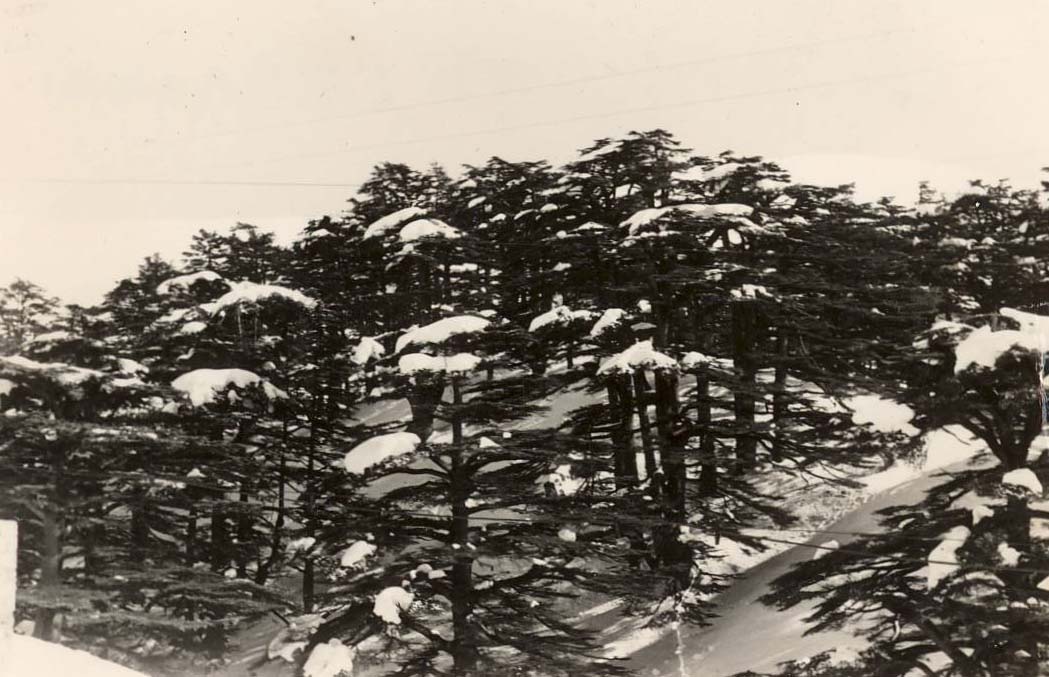 |
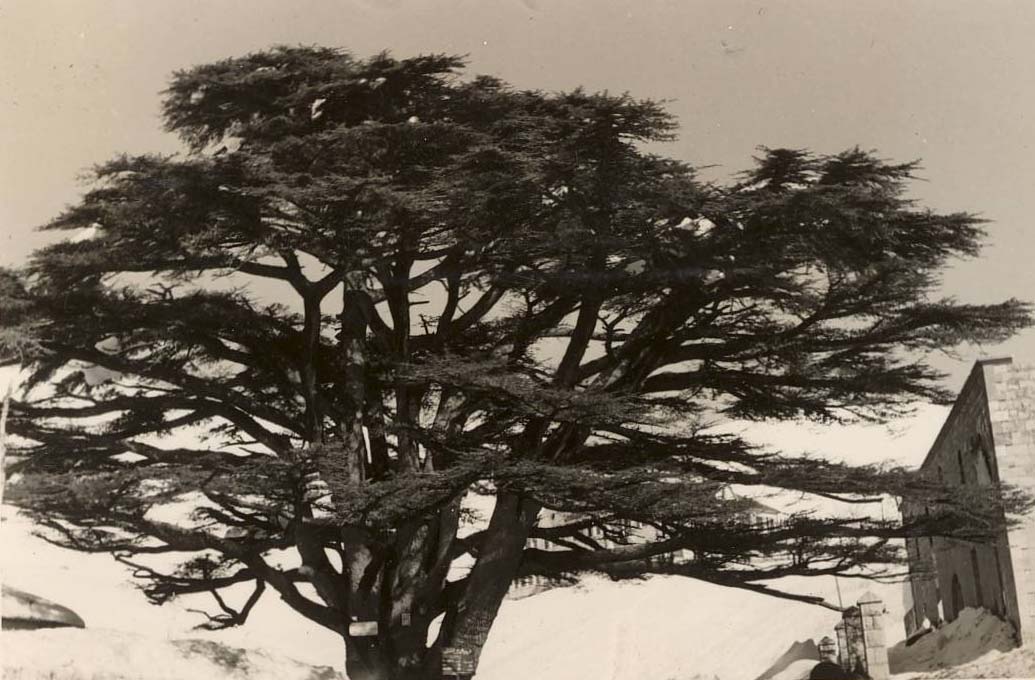 |
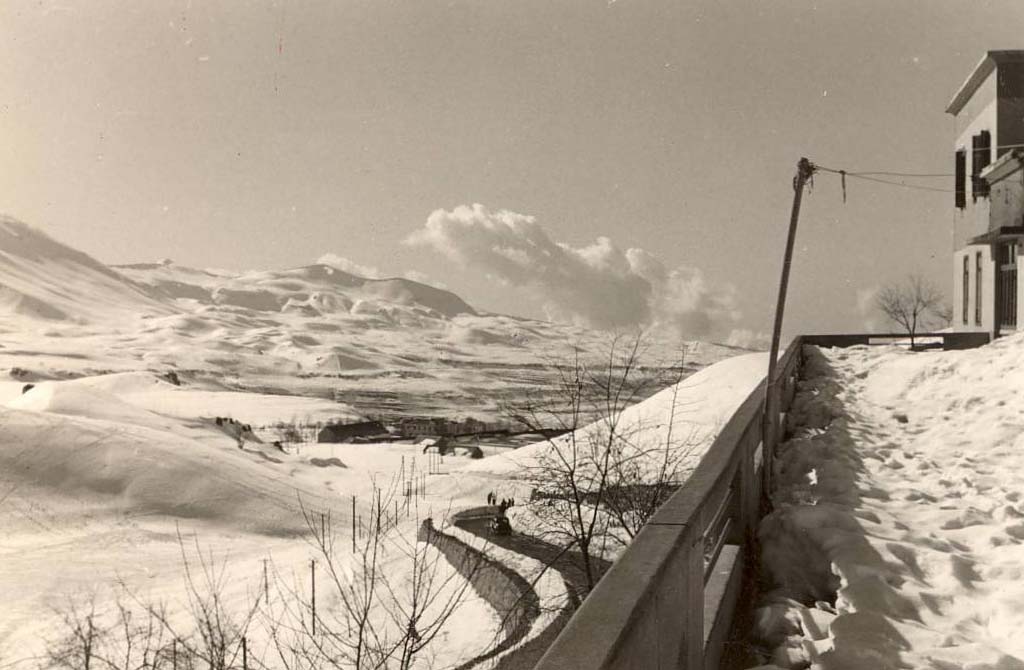 |
We didn't have ski stores, because there weren't shopping stores like department stores where you could buy ski pants. So the girls-you know, my girlfriends and I-went down to the Army/Navy surplus store and we bought U.S. Navy surplus pants, that have the buttons on that little fly-flap, you know? Have you seen those pants? They don't have like a zipper opening; they have a flap ten to twelve inches wide. And that's what wore for navy pants.
Okay.
Okay. We bought those, because the snow gets cold, and the pants were
really waterproof, and real warm.
Good.
Yeah. And those skis were hugely long. The way they figured out what size
ski you should have is you stood on your flat feet and you reached as high as
you could. And they selected your skis that would fit in the palm of your hand
when you were reaching as high as you could.
Wow.
That would mean that I was on almost a seven-footer.
Okay.
-which tended to make me fall over.
Were they too long?
They were real long. Yeah they were funny skis. So we had a good time. The
cedars were beautiful.
How does that compare-the mountains there-with the Idaho mountains?
Oh. You know, that's a difficult question to compare them. Huh--.
I hadn't skied in Idaho-I hadn't skied in anything [in Idaho. TS.] , until I got to be thirty-five. So there was such a long space in between, [to] think about comparing one to another. But it was just a spectacularly beautiful setting. And the cedars are so old. It was a different kind of experience than here. Here, we would have more spruce and pine, not old, old cedar. And of course, I wouldn't be qualified to judge the quality of snow for skiing.
So what else would you like to add?
And Beirut and Lebanon are fine places, and a culturally broadening experience
that I'm so grateful that I had. Besides that, that's where I met your grandpa.
About my time in the Middle East. [slow, thoughtful] I
hope that all the-that we would be able to do those things which contribute to
a peaceful environment rather than a politically competitive environment. So
that all those peoples can live with the dignity and self-respect that they
deserve, you know. Even though there has been conflict in the Middle East
between different groups of people there for many, many centuries, I would wish
that those things which feed that conflict would be eliminated . And I wish for
peace in the Middle East.
Okay.
So that was [good].
What was he doing there?
Yeah, he was there. He was over for one year of college. So I met him while
he started college, and I was a senior in high school.
What was he studying?
So he went for a year until. Beirut-there were not many of us Americans there;
we'd get to know each other from parties and different things that went on. So,
um, I met those two young men, uh, at some-at some party or other. And then
first I went with Bill, and then I later went out with John. But they were both
there for one year of college. And then John came back to Idaho, and [everybody
else] stayed on for another year.
Let's see. Oh-I don't know. I think it was a business course or something.
But he had a friend-oh, that's right. His best friend up at the University of
Idaho had a father who was in a Point Four program, which is an Ag program to
foreign countries-the United States to foreign countries. What their mission
was to go to other developing countries, and teach the people there how to farm
and make a profit at farming-farm efficiently and economically. And so the
father was going to work in Jordan. And so his son Bill and his wife were going
with him. Bill and John were fraternity brothers. And they asked John if he
would like to go over to Beirut as well. John had to pay his own way. But they
would sponsor him. So he had to be self-sustaining. He had to have enough money
to last the year.
So this was before the Peace Corps?
Oh! See, John didn't do Peace Corps; it was your-it was Kenneth, my
brother, who did the Peace Corps.
Oh.
John was in college over there. He didn't do the Peace Corps.
Okay.
Yeah.
Part of it seems similar.
The quality?
Part of what they do seems similar.
Well, yeah; well, yeah. What your the Point Four program was doing was more
in the cold sterile government-to-government arena teaching people to survive.
The Peace Corps goes over, they also are giving technology and information to
people that they work with. But they work more on a person-to-person basis,
where the Point Four is more at the government level and then trying to get
that information down to the people.
Oh.
Yeah. So the- but the goal was the same.
Got anything else you'd like to add?
No, I think that I've talked a lot more than I had thought that I would.
Yeah, this was interesting.
Good, good. I hope so. I hope it encourages you to travel one day.
Uh-huh.
All right. So is there anything else that I can do to help this along?
I don't know.
But if you need more information from a different viewpoint, and if you
have to do another interview, check in with Grandpa. He had some interesting
experiences during his travels there-which I didn't have, which are different
from my experiences. He also spent time in Jordan which I didn't.
Wow, that would be good.
Yeah. He would go to Jordan with his friend Bill. So they had different
experiences than I would have had.
Okay.
Okay, good. Thank you for asking me to do this.
I learned about my grandmother's time in the Middle East. She told me of many interesting experiences she had in Lebanon, like when she was saved from drowning. I also learned how she met my grandfather. She enjoyed being there very much, and having lived there, was saddened by the civil war which occurred. She is concerned about the violence in the Middle East. Much of what she said dealt with some historical causes. She still has contacts with people who went to school with her.
This interview was conducted over the phone. She was in Idaho. Some of the words I could not transcribe clearly; in these cases we tried to choose the best words. Other parts were edited out for clarity. In some of these cases, these are marked with an ellipsis. These are a minor part of the interview.
I am glad my grandmother took the time to talk with me. I learned more about her childhood. Thanks, grandma!
Aramco Timeline The company website contains a valuable timeline. It shows that two eastern oil companies joined Aramco: Standard Oil of New Jersey and Standard Oil Company of New York. Retrieved April 13, 2007.
CIA Reference Maps The maps of the Middle East and of Germany used in this article were retrieved from the 2007 CIA World Factbook on April 11, 2007. This notice was on the CIA website: "The Factbook is in the public domain. Accordingly, it may be copied freely without permission of the Central Intelligence Agency (CIA)."
Saudi Aramco World This January/February issue of the Aramco company magazine website contains an excerpt from Wallace Stegner's book. Copyright © 2004 Aramco Services Company. All Rights Reserved. Retrieved April 2, 2007.
Formation of the State of Israel in 1948 The Israel Ministry of Foreign Affairs site contains the text of the Declaration of Independence on May 14, 1948.
The CIA World Factbook 2007 entry on Lebanon contains a brief history and many statistics. Retrieved April 11, 2007.
Amazon.com has reviews for former President Carter's book, Palestine: Peace not Apartheid. (2006). Retrieved April 11, 2007.
This website provides a good history of the forest in Lebanon as well as its significance to various nations. The forested area was previously much larger than it is today.